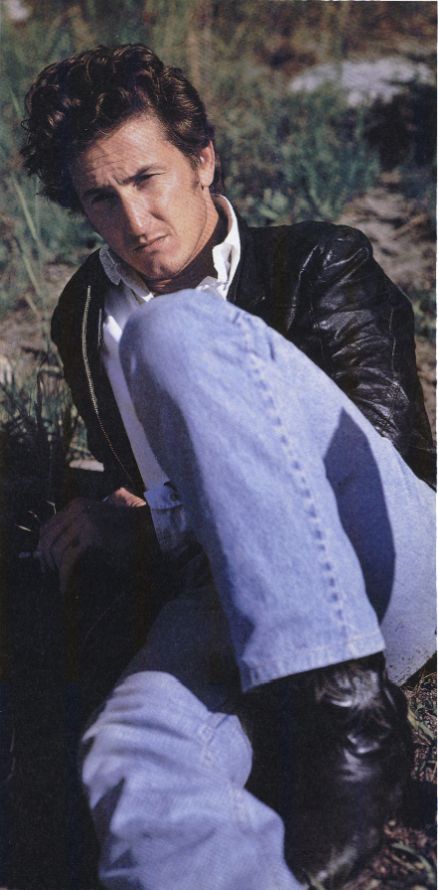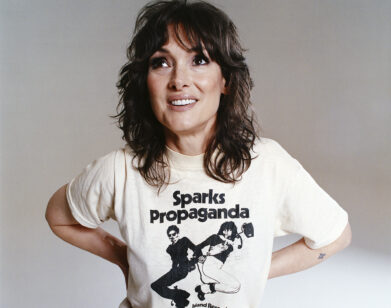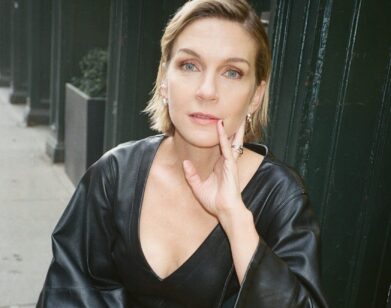New Again: Sean Penn
In New Again, we highlight a piece from Interview’s past that resonates with the present.
In the new indie movie This Must Be The Place, Sean Penn plays a retired rock star on a mission to find a Nazi war criminal and avenge his recently deceased father. Dressed to resemble The Cure’s Robert Smith, Penn’s character speaks in a whispery, high-pitched voice and wears heavy, glam-rock makeup—a striking departure from the public perception of Penn the rugged, steely, serious actor. Penn has begrudgingly carried this bad-ass persona since our interview with him back in October 1995. He was 35 years old then, and had enough knowledge of his image to say, “I like the public perception of me that makes people a little bit too scared to come to the table when I’m out having dinner.”
Though he’s known to be reserved with the press, Penn was anything but shy in this interview with our then film editor, Graham Fuller. At the time of our interview, he had just finished working on a film he wrote and directed, called The Crossing Guard, starring Jack Nicholson and Anjelica Huston. Penn was going through a bit of an acting dry spell and was completely enthralled in his work as a writer and director; a film would need to deeply to deeply move him before he would accept the role. Little did Penn know that his greatest roles were still ahead of him, in films like Sweet and Lowdown (1999), I Am Sam (2001), Mystic River (2003), and Milk (2008). (The latter two won him Academy Awards for Best Actor.) Over the past 17 years, Penn’s broadened his “rebel” image and has become a respected leading man known for taking risks cinematically, both in front of and behind the camera. Read on for this surprisingly close look at Sean Penn as he opens up about fatherhood, his relationships, and his career. —Melissa Belk
Sean Penn
By Graham Fuller
Not slicked up. Not watered down. Not smoothed around the edges. Not humorless. Not Mr. Wrong. Not with Miss Wright. But read all about how he’s right about a whole lot.
Sean Penn was always the least ingratiating of movie stars. Blunt and irascible, he made a mockery of the very concept of public relations. He was never impressed by the idea that he had to sell anything, least of all an image that was separate from his own personality. 14 years in the public spotlight haven’t smoothed his edges.
As the writer-director of The Indian Runner (1991) and this month’s The Crossing Guard, Penn seems fascinated with wayward, wounded uncontrollable men whose very plight demands that they be regarded with compassion. As raw and grueling as its predecessor, but stylistically more assured, The Crossing Guard is the story of a divorced man and woman (Jack Nicholson and Anjelica Huston) who have each found a different way of dealing with the accidental hit-and-run killing of their young daughter six years earlier, and the father’s confrontation with the man responsible (David Morse) on his release from prison. You don’t have to be a psychologist to see trace elements of Penn’s own personality in the male protagonist. And you only have to go to the local Cineplex to see that there is no other film like The Crossing Guard being released this fall.
Penn is a reluctant actor these days, but he plays a death row inmate opposite Susan Sarandon’s nun in Tim Robbin’s Dead Men Walking later this year, and he is slated to play Brendan Behan in a forthcoming biopic about the bibulous Irish playwright —perfect casting. He had just stepped off the night plane from Los Angeles when we met at his hotel in midtown New York. He gave instant response to my questions, occasionally getting up to light a cigarette, rifle through his bag, or open a window to test the air outside.
GRAHAM FULLER: I’d like to start by asking you where you’ve been for the past few years. I know that you’ve become very passionate and committed about writing and directing on The Indian Runner, and you said after making that film that you were going to quit acting for good. Well, you subsequently appeared in Carlito’s Way and gave one of your best performances in it. For a lot of people, though, you seemed to disappear between The Indian Runner and your new film, The Crossing Guard. What happened?
SEAN PENN: I spent so much time as the director of The Indian Runner, and it was right after finishing it that I had my first child. The woman I was with at the time [actress Robin Wright], the mother of my kids, then got the chance after her pregnancy to work in a movie [The Playboys] that was being shot in Ireland. We all went over there, and I spent that time just being with my daughter and writing a script when she was in bed. I was working on an adaption of a long novel, something I hadn’t tried before. I had, like, eight hundred pages that I was dealing with there. When I came back, I kept hammering away on that script. I also started to split with my daughter’s mother. I was then living in this little apartment, baby-sitting a lot by day and drinking and writing at night. I couldn’t crack the ending of that script. At that point, I didn’t know what I wanted to write about that I could direct, and then Eric Clapton’s child died—and it was such a wake-up call. I started writing The Crossing Guard the next day, and that just flowed.
Having written it, I had a tough time getting it set up with the controls that I wanted on it. I don’t think the studios wanted to give two dimes to make another movie like The Indian Runner, and I needed to know that I could do it my way. While all that was going on, I got a late-night call from Brian de Palma, whom I’d worked with before [on Casualties of War]. I needed a chunk of change—because I had a kid now and bills to pay—and the part Brian was offering me in Carlito’s Way was a good one, plus it was with Al [Pacino], whom I love, so I did that. And then eventually I was able to set up The Crossing Guard.
FULLER: Tell me about your writing process.
PENN: It’s pretty much rock-‘n’-roll. I sit down and start feeling stuff and writing. The Indian Runner was easy. It had been incubating in me for eight years, and by the time I sat down to write the thing, I had all the pictures in my head. I knew what the characters talked like and felt like and moved like and looked like and who they were. It was all pictures, pictures first, and then I filled in the dialogue. The Crossing Guard was the opposite. I knew that I wanted to write something for actors who’d be so good they’d really be able to tell me what the heart of the story was. I had a map in my head, which was going to tell me the story, but I also had the actors come in to rehearse scenes and what ideas they had that day.
FULLER: Do you structure your scripts along classic lines?
PENN: I think of myself as antistructure.
FULLER: [laughs] That might apply to a lot of things.
PENN: Uh… yeah. [gives the wryest of wry smiles] I just think that not enough movies allow for characters to have mood swings. They’re often anything but chemical! If you’ve got a character who eats too much sugar in a scene in one day, it ain’t just the story plot that’s going to make him feel like a prick the next day, or whatever it is. I want to allow for that. The unnatural thing of having an actor come in at six in the morning and put makeup on and clothes that aren’t theirs is bad enough. You want to make use of the very thing that brought them there that morning, or whatever they went through the night before, or whatever happened on the phone, what happened between them and their mother, father, brother, or priest. The actor’s continuity if knowing who the character is, not what the last scene was. I write for that kind of freedom for the actors.
FULLER: How did you get Anjelica Huston and Jack Nicholson to work together again?
PENN: It wasn’t hard. Jack said to me when I brought up the idea, “I’m the wrong guy to ask. I’m a good-time guy!” [laughs] Jack and Anjelica have their history, and I thought that history would be invaluable, particularly because it would just set a level of honesty to the film. At the end of the day, clearly they’re two people who respect each other, and even though their romance is long over and complications may exist, there’s still a love there. I knew they’d be sending each other a gift between every time I said “Action!” and “Cut!”
FULLER: What kind of control were you after as a director? Final cut?
PENN: Yeah, though final cut and all it implies is a cliché. For me, as the writer of a film, I certainly don’t want anybody to fuck with it. That’s part of it, sure, but the other part is, here’s somebody putting a lot of faith in you and a lot of money, and, yes, you want to come through on that because you want it to happen again. But there’s also a personal thing that happens. You do feel an obligation to do what you think is the best version of the film you sold them in the first place. You might disagree with what that is, once you’ve got it on film, but you’ve got to stay true to what you were selling. If I’ve got final cut, then I don’t mind inviting arguments into the process; they’re not threatening. Every fucking moment of our movie should be a big deal, and if it’s cohesively not part of one person’s heart, it’s shit. If you can’t count on your heart having some kind of unified response, you can’t count on anything. You use your heart as a barometer for your movie’s completeness.
FULLER: Why are you so drawn to creating images?
PENN: It’s just something that turns me on. You know, I’m a huge Woody Allen fan. Good movie, bad movie, it doesn’t matter— I just like his movies. I’d love to see Martin Scorsese direct one of his scripts with Woody Allen in it. I would love to see Scorsese do one of John Cassavetes’ scripts. What John and Woody have in common is almost a resentment for the camera. I love the camera. I spent most of my acting career paying attention to what a three-inch lens does and what a two-inch lens does, and lighting and all of that. My level of cinematic grammar is still at a growing stage, but I like the way you can make people feel things with an image, or the way you can designate how long they look at it. I like to make things look like how they feel—how they feel to me.
FULLER: In The Crossing Guard, was the chief emotion you were trying to get at the grief of these parents still years after losing their child, or were you more concerned with the face-off between the father and the drunk driver who killed her?
PENN: I was concerned with: What do you do with unbearable loss? There’s a singer called Jewel, whom I asked to write a song for the movie, and she wrote, “Where does love go when it can’t find a home?” She’s going to be the next Bob Dylan.
FULLER: Tell me more about this emotion of loss.
PENN: I love stories about people who are smart enough to know that what they’re doing is destroying them, but that knowing that doesn’t help them. I’ve seen them a lot. I’ve experienced it. There’s nothing more dramatic, in a way. I’ve gone on record before about this, because everyone assumes that I want to take my middle-class upbringing and turn it into some kind of working-class deal on film. To me, it’s not about that, it’s about the fewer options you’ve got, the more drama there is.
FULLER: What do you mean by options?
PENN: I’m talking about the options of a guy who ain’t going to get on with his life if he doesn’t show up and punch the clock every morning. Where does he have the chance to let it out?
FULLER: When you’re writing, do you find that you pour your own issues into the scripts?
PENN: Only.
FULLER: Can you expand on that a bit?
PENN: There was a reason why I wanted to direct instead of act. And when I say direct, I mean write, direct, and edit, because for me, it’s all one thing. I would say that a non-writer-director has as much to do with a writer-director as a grocer does to a barber: It’s got nothing to do with it. When you act in a film, you’re inevitably surrounded by people you didn’t choose, right down to the set painter. I like being able to pick the family I’m waking up to in the morning that’s going to make this group effort to tell a story that applies to what’s interesting to me at that stage in my life. When I sit down to write and direct, it comes out of something I’m looking into, something I don’t have to answer to. If I’m acting, I’m going back and looking at something I already know. I know this guy I’m playing either emotionally, metaphorically, or literally from my past—I’ve already got that done. And if I know how a movie ends before I start it, or what it means, I don’t want to make it.
FULLER: What emotions that you’d personally been experiencing really make themselves felt in The Crossing Guard?
PENN: Questions of guilt, I guess. Guilt… and where do you put rage? And what is rage, if not a buffer for facing loss?
FULLER: Can you tell me what the source of all that is?
PENN: I guess the need to get people to agree that they all recognize that the same tenderness is impossible. Right from the moment you’re born, you try to maintain some kind of sensitivity and love and compassion for the world and your fellow man, and all that horseshit, and little bits of it get beaten out of you every day. Despite that, you try to fight it. But when something dramatic happens and you haven’t evolved enough to deal with that problem yet, then you’re stuck with things like violence. The Crossing Guard deals with that a lot.
FULLER: Given what you’ve just told me, how do you avoid becoming cynical?
PENN: I think you’re either born with a resistance to it or you’re not. My friend Charles Bukowski, to whom The Crossing Guard is dedicated, was one of those guys who was given every opportunity in life to become a jaded, cynical prick. But he was anything but. He was the sweetest, most vulnerable pussycat. He disguised it wonderfully. [laughs] But he was the real goods in terms of preserving his innocence and optimism and love.
FULLER: You seem to be drawn to a certain kind of man like Bukowski, Dennis Hopper, who was in The Indian Runner, and Nicholson. It didn’t escape my notice that you’d chosen to work with Nicholson, another one of those Easy Rider guys. It struck me as significant that you wanted to direct him.
PENN: [laughs] I ran into Peter Fonda in a restaurant last night before getting on a plane to New York…
FULLER: These are all guys who exist inside and outside the mainstream at the same time. They’ve never thrown their lot in with Hollywood entirely. They’ve never really followed the party line. You seem to be cut from the same cloth.
PENN: There is no party line. There is just selling out to a party line that doesn’t exist. If there is a party line, it’s something fake anyway. These are guys who’ve gotten as much pain as they can take, who’ve come up against very high levels of shit—like everyone else does. I don’t see life as an opportunity to see how far you can go in the pursuit of pain, although I think I’ve challenged it a bit. I think somehow that anything you’re going to be able to survive is gonna be thrown at you at some point. These are all guys whose souls survived that, and that to me is an inspiration. I respect those guys.
FULLER: Do you think those guys espouse a certain kind of masculine code or creed that is personal to you as well?
PENN: Oh, I think they’re a pack of wolves! Yeah. Sure. They are. And that’s being true to your spirit, too. I don’t think masculinity is about… I think it’s about instinct, and the first instinct is love. It’s the same for women, but it manifests awfully different, and I ain’t no expert on it.
FULLER: Do you find it easy or difficult to write women characters?
PENN: I have a good time writing them, because they tend to be love letters to whomever I’m thinking about at that time. Homages to their toughness.
FULLER: What do you think about women?
PENN: They’re the best. The toughest. The bane of my existence. And I’ll forever fall for it.
FULLER: When you’re involved with a woman, do you feel a tug to be with her exclusively, or do you feel a tug towards other women as well?
PENN: I feel strictly tugged to one woman. That’s always been the case for me. I’ve certainly gone astray from that at times, but less and less in my life is there that conflict. It’s the old story: It’s about communication. If I click with somebody, my eyes stay straight ahead. I’m in pursuit of an authentic life. I don’t want to lie, play games, hurt somebody, or get hurt. You can only go forward in one direction. You can do it serpentine if you like, but you’re not going to get anywhere and if you do you’re going to get there much more slowly. I’m trying to straighten the line out a little bit more each day. The last relationship I was in… certaintly, had it lasted, I wouldn’t have gone anywhere else.
FULLER: Do you think monogamy is a sign of maturity?
PENN: I get a little scared of words like maturity. I used to keep a comic strip in my pocket. It showed a little guy in a bowler hat walking down a street—England’s equivalent of Wall Street, I guess—and there are a couple of guys yelling at him, “Don’t mature. Mature people do shit work.” And I think that’s true. Today, maturity is a word I associate with spirituality. It’s one of those words that cause people to change their voice. When your voice gets higher because of what you’re saying, there’s a problem. To me, the conflict of life is part of the joy of life. There’s got to be a recognition of the friction that exists. Maturity seems somehow about getting careful. I don’t want to be careful.
FULLER: Do you feel unrest?
PENN: Sure, I feel unrest, but I feel more and more comfortable with it.
FULLER: I told one or two people that I was going to be interviewing you, and they said, “Oh, he’s such a rebel.” What do you think about that?
PENN: Rebel is just as bad a word as maturity. It’s a word I associate with James Dean and dying at 24. I’ll be 35 years old tomorrow, and I’m going to keep going. Rebels seem like a romantic notion to me, and I’d like to keep romance between me and a woman.
FULLER: Does a label like rebel offend you?
PENN: Nope, I don’t get offended by too much. It’s OK. The way it’s intended sometimes, you can’t help but get a little giggle out of it. It’s just semantics really. [pauses] I like the public perception of me that makes people a little bit too scared to come to the table when I’m out having dinner. I don’t mind that, Bukowski said, “I know I’m good, so I like that people think I’m bad, because it gives me a dimension, effortlessly.”
FULLER: But don’t you then have to live up to the reputation?
PENN: No. Reputations are maintained by the outside world, and they’re created by it, too, by and large. And they serve as a hell of a device for privacy, because the more people look for something that’s not there, the less chance they have of violating who you are. It’s like going out there with a mask on, without having to exercise your upper body to put it on.
FULLER: What are your feelings these days about the media?
PENN: I think it’s a pollutant. I live in a 27-and-a-half-foot Airstream trailer in 50 acres of mountain canyon. You don’t hear a human sound. In a trailer like that, you can only have a TV set so big. It’s not the kind of TV that makes you want to sit back and fall asleep watching some dumb thing. I use it to look at my dailies or maybe to catch the news when I see smoke 10 miles away, to find out if my house is burning down. But that other TV stuff I don’t have in my life that much anymore. I don’t read newspapers too much either, just because they tend to make me feel I have a political obligation that I think is a distraction from what my political offerings are going to be if I just make my movies. Then, as far as airport reading goes—Entertainment [Weekly] magazine, Time magazine, whatever it is—the message they give is that the mass’s opinion is always right. It’s exploitive, it’s unthoughtful, but it’s not just the media that’s responsible: It’s in harmony with the culture and the so-called arts. Movies are unthoughtful, music’s unthoughtful. But there are great exceptions. There’s an exception sitting right there. [indicates a CD by Jewel on the hotel room table]
FULLER: Do you see yourself as a different guy from what you were 10 years ago?
PENN: I’m a little bit more sober. I’ve got two kids now, and that changes things. But no. I don’t see myself as a different guy than I was ten years ago. I don’t have aspirations to be. It’s really about where you’re putting your energies. That’s changing a lot.
FULLER: In what ways?
PENN: Well, the greatest fear in my life was getting happy. I’m not so afraid of that anymore.
FULLER: You mean the fear of sliding into contentment?
PENN: I mean sliding into a fear of adventure.
FULLER: How does responsibility sit with you, both as a father and as a director who has to be a leader to the people he hires?
PENN: I like having no out. There’s the old notion that where there’s choice, there’s chaos, and where there’s no choice, there’s clarity. If you’ve got no choice, you’ve gotta be there, and you’ve gotta have your heart in it. It leads to a much less self-conscious life. It’s true if you’ve got kids. It’s true if you step in front of a train, which is what you do when you make a movie. You’ve go to keep running on the track until the end.
FULLER: Are you tough on the set?
PENN: Real easy. Which surprised me a lot on The Indian Runner. I thought I’d come down tyrannical and hellacious on everyone, and I got there and it was just too much fun. There’s no need for that shit. It was a life lesson, and I’m still trying to parlay that into my day-to-day life. On a movie, it’s always better to stay invisible as much as you can to keep things calm. I like to whisper to my cameraman, I like to whisper to my actors, and whoever else I’ve gotten to whisper to.
FULLER: If the situation demanded it, would you manipulate an actor to get a performance?
PENN: Sure, I’d do anything to get a performance, short of malice.
FULLER: Has being a director changed your feelings about your relationships with other directors when you act?
PENN: Yes. As a director you have those days when you say, “I understand your problem with the scene, but the sun is going down, we have to [shouts] FUCKING SHOOT. ACTION! DO IT!” I will do that; you’ve got to make the movie. I don’t think I was particularly tolerant of that as an actor for a long time. On the two pictures I’ve acted in since becoming a director, I’ve been pretty much on time and had my words ready.
FULLER: Does acting still fulfill a need in you?
PENN: Financially. Period. I don’t like it. I’m an appreciator of it in a big way and I love it for the people for whom the process doesn’t cause too much grief. For me, it’s a lot of turmoil.
FULLER: Would you give it up, in a perfect world?
PENN: Yeah. Over the years, I’ve gotten myself obligated to certain projects, should they get made. And while I was finishing cutting The Crossing Guard, Tim Robbins game me the script of Dead Man Walking. I read this thing, and my tears hit the page, and I said, “OK, time to be called on here.” There are those times when you do it because you need the cash, but I’m not going to take something for cash and not give it as much as I would if it were something I loved.
FULLER: Is it important to you to become critically respected as a director?
PENN: Sure. Listen, you like it when the reviews are good, and you don’t believe them. You hate it when they’re bad, and you do believe them. What are you gonna do about it?
FULLER: You seem to be where you want to be right now.
PENN: I am. I’m getting a lot of support, and there are people I want to support in return and people I want to work with. I’ve got a lot of stories in my head right now that I want to get on the typewriter. I’ve got no complaints.
FULLER: What about your personal life?
PENN: I’ve gone through four years of nightmares with my family breaking up, and that’s hard. I grew up in a family that stayed together, so my image of a father was a lot different from what I experienced. I didn’t know where to stand in that room. It took me four years to begin to figure that out. I experienced some pretty bitter words with the man above, if he exist. But I’m coming out of it.
FULLER: Are you happy?
PENN: Getting there.
THIS INTERVIEW INTIALLY APPEARED IN THE OCTOBER 1995 ISSUE OF INTERVIEW.
For more New Again, click here.







